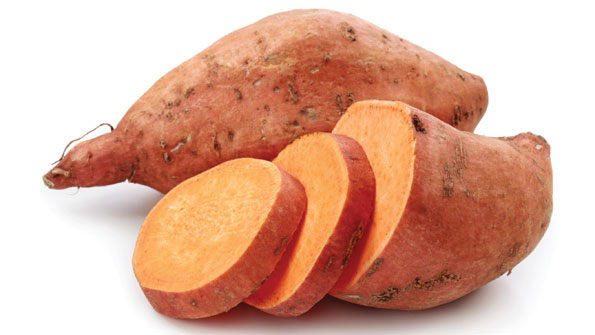Sweet potatoes are tuberous crops with the scientific name Ipomoea batatas.
They are naturally sweet and can be enhanced when cooked. Sweet potatoes are some of the oldest foods known to humanity. They are native to Central and South America.
They are typically grown by small farmers, often on marginal ground. This crop plant has a long history of saving lives. It matures fast, is rich in nutrients, and is often the first crop planted after a natural disaster, providing abundant food for otherwise starving populations. In eastern Africa the sweet potato is known as “the protector of children” or cilera abana because it is often the only food that stands between a child’s survival and starvation.
Growing Sweet Potatoes
Sweet potatoes are tropical plants that can also be grown in the summer in temperate regions as long as they have at least five frost-free months combined with fairly warm days and nights. They can be grown from vine cuttings or by planting pieces of the roots. To grow new plants, place one or more sweet potatoes in a bed of sand and cover with a couple of inches of moist, sandy soil.
Harvesting Sweet Potatoes
Roots are harvested as the leaves begin to yellow in the fall. They are then brushed clean and left to cure. Traditionally curing involved stacking the potatoes in the field or garden, covering them with sand, and leaving them for several weeks. Sweet potatoes in commercial production are cured in rooms with humidity between 75 percent and 80 percent and temperatures between 80°F and 86°F (27°C and 30°C). Curing heals cuts and reduces decay and shrinkage during storage, and it converts some starches to sugars, improving the flavor. Once cured, sweet potatoes can be stored for several months, and white-fleshed varieties last as long as ten months.
Varieties Of Sweet Potatoes
It’s interesting to know that the International Potato Center in Peru maintains a gene bank consisting of over 6,500 varieties of sweet potato.

Sweet Potatoes | https://www.deliciousliving.com
Here are Just a Few of the Most Popular Types of Sweet Potatoes:
- Garnet, Jewel, and Beauregard sweet potatoes have reddish-orange skin and deep orange flesh. These are often the ones that are mistaken as yams at mainstream grocery stores.
- White sweet potatoes are crumbly, with white flesh and golden brown skin. They don’t contain as many antioxidants as orange varieties.
- Okinawan sweet potatoes are also known as purple sweet potatoes because of their high anthocyanin content. Anthocyanins are the pigments that give red, blue, and violet plant foods their beautiful colors. Anthocyanins are also what give Okinawan potatoes 150% more antioxidant power than blueberries. Despite their name, Okinawan potatoes are actually native to the Americas. They were brought over to Japan sometime in the 16th century, where they grow well and have become a staple in Japanese dishes. In North America, you will most likely find true purple sweet potatoes in an Asian supermarket.
- Japanese or Satsumaimo sweet potatoes are known for being sweeter than most other types. This is especially true when they start caramelizing in the oven.
Health Benefits Of Sweet Potatoes
1. Sweet Potatoes Are Nutritious
It’s best to start with the basics, and the most basic fact about sweet potatoes is that they are thoroughly packed with nutrients. When it comes to their basic makeup, sweet potatoes are about 77 percent water, 20 percent carbohydrates, 1.6 percent protein, 3 percent fiber, and practically free of fat. What’s more, a medium sweet potato contains about 180 calories, while being a good source of a range of vitamins and minerals, including vitamin A, vitamin C, manganese, vitamin B6, magnesium, and potassium.
Their nutrient composition also makes them particularly great for sleep when consumed at dinner or as a late-night snack. “They are rich in potassium, which helps your muscles relax. They also have magnesium, which promotes GABA secretion in the brain—a relaxation-inducing neurotransmitter,” says Vincent Pedre, M.D., gut health specialist and mbg Collective member. “And as a complex carb, they digest slowly, providing the steady energy your body needs to make it through the night in a fasting state.”
2. Sweet Potatoes May Improve Your Memory
Purple sweet potatoes, in particular, have been linked to better brain function. In animal studies, purple sweet potatoes have been shown to protect the brain and improve learning and memory. We can thank purple sweet potatoes’ high levels of anthocyanins, antioxidants that help reduce inflammation and protect neurons against free radical damage, for this brain-boosting magic.
While no similar studies have been conducted to verify these results in humans, research has shown that people who eat a lot of antioxidant-rich fruits and vegetables have, on average, a 13 percent lower risk of developing dementia.
3. Sweet Potatoes Are Great For Digestion And Gut Health
Because sweet potatoes are excellent sources of not one but two kinds of fiber, they’re amazing for your digestion. Sweet potatoes contain both soluble and insoluble fiber. The human body can’t digest either type—so instead of breaking down as they pass through the digestive tract, these fibers travel along intact, doing great things for your gut in the process.
Both types of fiber play an important role in keeping bowel movements regular. Soluble fiber (also known as viscous fiber) absorbs water, which softens stool, while insoluble (aka non-viscous) fiber doesn’t absorb water and therefore adds bulk that makes stool solid.
Not only is eating a fiber-rich diet good for alleviating constipation, diarrhea, and bloating, it’s also great for your colon and overall gut health. Fiber feeds the good bacteria in your gut and has been shown to promote the health of the cells lining the digestive tract, potentially helping to prevent leaky gut. Eating a high-fiber diet has also been shown to lower the risk of colon cancer.
The antioxidants in sweet potatoes may also promote gut health. In test-tube studies, antioxidants in purple sweet potatoes were shown to aid in the growth of a specific type of gut bacteria that helps lower the risk of developing irritable bowel syndrome (IBS).
4. Sweet Potatoes Are Full Of Age- Defying Antioxidants
In addition to vitamins and minerals, sweet potatoes are also home to a wealth of antioxidants. This is especially true of orange and purple sweet potatoes. Antioxidants are important because they help protect your body from free radicals—unstable molecules that damage DNA, cause inflammation, and have been linked to chronic and serious health conditions, like cancer and heart disease. In basic turns, free radicals accelerate the overall aging process. This means that just about any source of antioxidants is a good addition to your diet.
In addition to anthocyanins found in purple sweet potatoes, orange sweet potatoes are chock-full of an antioxidant called beta-carotene. This compound is what gives traditional sweet potatoes their signature orange hue. When your body processes beta-carotene, it turns it into vitamin A, which is key to maintaining healthy eyes and vision. Additionally, beta-carotene is fabulous for the skin. Not only do food sources of beta-carotene literally give your skin a natural glow, but research shows that they help protect skin from the sun’s damaging UV rays.
5. Sweet Potatoes May Boost Your Immune System
The next time you’re looking to boost your immune system, don’t simply reach for orange juice or vitamin C—add an orange sweet potato to the mix, too (they make a great addition to smoothies). As one of the best natural sources of beta-carotene, orange sweet potatoes are a great source of vitamin A (beta-carotene is converted to vitamin A in the body), which is vital to healthy immune system functioning.
Additionally, the fiber content of sweet potatoes can also boost immune health. Fiber is needed to feed beneficial gut bacteria so they can multiply and improve overall gut health. A healthy gut, in turn, is key to optimal immune system functioning, as about 80 percent of the immune system lies in the gut and is heavily influenced by what happens there.
6. Sweet Potatoes May Have Anti-Cancer Properties
If you’re looking to adopt an anti-cancer diet, eating more purple sweet potatoes is a great idea. As mentioned above, they contain antioxidants called anthocyanins, which have been shown to help slow the growth of cancer cells (including bladder cancer, colon cancer, stomach cancer, and breast cancer cells) in test-tube studies. Similar studies on mice have shown that eating purple sweet potatoes may lower the risk of colon cancer. These results have yet to be replicated in humans, but they’re still promising. Beta-carotene from orange sweet potatoes may also help reduce the risk of various cancers, including lung cancer.
7. Sweet Potatoes Are A Diabetes-Friendly Food
Some evidence suggests that regularly eating sweet potatoes may help improve blood sugar regulation in people with type 2 diabetes. That said, people with diabetes should watch their serving size, since this root vegetable still has a medium to high glycemic index (which measures how fast a food causes blood sugar values to rise after a meal). If you struggle with diabetes and love sweet potatoes, keep in mind that boiled sweet potatoes seem to have a lower glycemic index value than fried, roasted, or baked sweet potatoes do. Pairing sweet potatoes with a good protein source and other fiber-rich foods also reduces their glycemic load.
Used As A Medicine
Sweet potato roots and leaves are used in folk remedies to treat illnesses as diverse as asthma, night blindness, and diarrhea. Easily digestible, they are good for the eliminative system. It is believed they bind heavy metals, so they have been used to detoxify the system.
Something To Remember
Sweet potatoes are well tolerated in most people. However, they are considered fairly high in substances called oxalates, which may increase your risk of kidney stones. Individuals who are prone to getting kidney stones may want to limit their sweet potato intake.
About Sweet Potatoes
Sweet potatoes are underground tubers that are excellent sources of beta carotene, as well as many other vitamins, minerals, and plant compounds.
This root vegetable may have several health benefits, such as improved blood sugar regulation and vitamin A levels.
Overall, sweet potatoes are nutritious, cheap, and easy to incorporate into your diet.
Article References:
- https://en.m.wikipedia.org/wiki/Sweet_potato
- https://www.medicalnewstoday.com/articles/281438.php
- https://www.healthline.com/nutrition/sweet-potato-benefits







